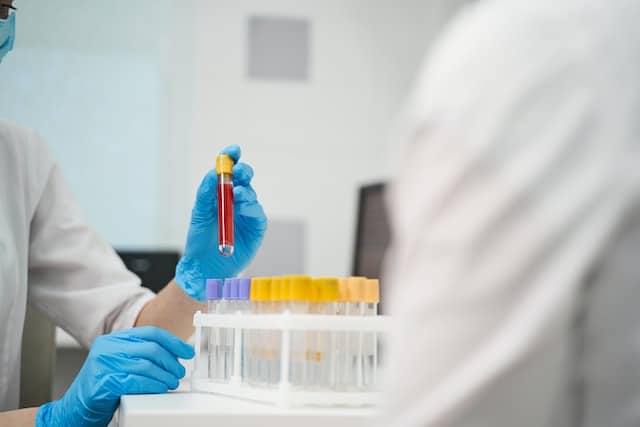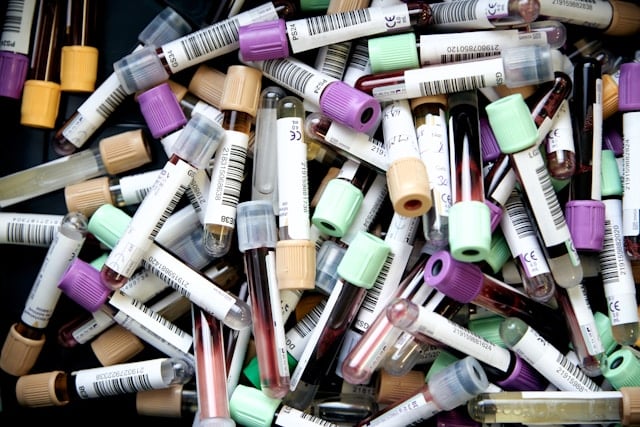Fujirebio’s new blood test for Alzheimer’s biomarkers is the first to receive FDA approval, opening the door to Medicare coverage. Here’s what it can and can’t do.
More than seven million Americans live with Alzheimer’s disease. For many of them, getting a diagnosis is difficult and expensive. Though covered by medicare, the current array of gold-standard diagnostics — like cerebrospinal fluid tests amyloid PET scans — are invasive and difficult for many Americans to access. New Alzheimer’s drugs are designed to slow the disease from progressing, but only people in the earliest stages of symptomatic Alzheimer’s are eligible to take them, so if these drugs are indeed a good option for an individual patient, delays and lags in the diagnostic process could mean a missed opportunity. Could a quick, simple new blood test change all that?
Though several new Alzheimer’s blood tests have hit the market in recent years, a new approval marks the first time that an Alzheimer’s blood test has received regulatory approval. On May 16th, the U.S. Food and Drug Administration approved Fujirebio Diagnostics, Inc.’s blood test for Alzheimer’s disease.
However, there was some confusion as to whom the test is approved for: According to the FDA press release, the test was greenlit for use by neurologists in people aged 55 and older who have cognitive symptoms, but a spokesperson for Fujirebio told Being Patient that the press release was incorrect and that the test greenlit for an even younger audience: people aged 50 or older who have cognitive symptoms. (This correction was confirmed in an FDA document explaining when the test can be used.)
Called the Lumipulse G pTau217/β-Amyloid 1-42 Plasma Ratio test, this blood test measures the levels of two proteins in the blood that help determine whether beta-amyloid plaques — key biomarkers of Alzheimer’s disease — are building up in the brain.
On its own, the test cannot definitively diagnose Alzheimer’s. It is designed to accompany other stages of a full diagnostic process for people who are experiencing cognitive symptoms, serving as a first step for clinicians who want to determine whether or not these Alzheimer’s-linked protein biomarkers may be present, before or instead of running pricier, more specialized, or more invasive tests.
“The lack of effective, accessible and minimally invasive diagnostics for Alzheimer’s disease contributes to its late diagnosis and inadequate treatment,” Fujirebio CEO and president Monte Wiltse said in a press release. “The Lumipulse G pTau 217/ β-Amyloid 1-42 Plasma Ratio test will go a long way to assist physicians and patients to obtain an Alzheimer’s Disease diagnosis in the early stages of the disease, when interventions are more effective.”
According to Dr. Suzanne Schindler, a dementia specialist at Washington University in St. Louis, the approval is somewhat of a milestone in Alzheimer’s diagnostics: “Insurance has not been consistently covering the cost of Alzheimer’s disease blood tests, which has led to hesitancy in ordering them,” Schindler told Being Patient. “With this approval, I expect that these blood tests will be covered and clinicians will feel more comfortable ordering them.”
Can the test diagnose Alzheimer’s disease?
Quick answer: No, this test cannot diagnose Alzheimer’s disease on its own. There are some headlines from major news outlets suggesting that the test diagnoses Alzheimer’s disease: Those outlets are mistaken.
“No biomarker tests are truly standalone,” Schindler explains. “The results must be integrated with the clinical assessment to reach a clinical diagnosis of symptomatic Alzheimer’s disease.”
A blood test like this one is intended to be one of the final steps in the process of confirming an Alzheimer’s diagnosis.
A positive test can help someone receive a diagnosis while they’re still in the early stages of Alzheimer’s and may be eligible to take the anti-amyloid drugs Leqembi or Kisunla.
There’s a lot of work that goes on before this test comes into the picture: Doctors need to take a medical history and and rule out other causes of cognitive impairment, like long COVID, menopause, hormone deficiencies, or medications, through cognitive tests, brain imaging, or other diagnostic methods.
In clear-cut cases, where people have the tell-tale symptoms of Alzheimer’s and a family history of the disease, more testing beyond the Fujirebio blood test may not be needed needed. But in more complex cases, where symptoms overlap other forms of dementia and there is no reason to believe the person carries any genetic risk factors — or, the test results come back showing middling / inconclusive biomarker levels — other testing, like a PET scan or cerebrospinal fluid test, may be necessary to confirm the diagnosis.
Fewer than 20 percent of people who took the blood test received an indeterminate result.
A Neurologist’s Deep Dive Into Blood Biomarker Tests for Alzheimer’s
How accurate is the test?
The company submitted data from a clinical study of 499 participants assessed for Alzheimer’s disease. All the participants received a blood test and an amyloid PET scan or CSF test.
The results of the blood test were often in line with the older, gold standard methods. A positive result on the blood test matched up 91.7 percent of the time to a positive result on a CSF test or amyloid PET scan. Meanwhile, participants who had a negative blood test also showed no signs of amyloid plaques on the CSF test and amyloid PET scan 97.3 percent of the time.
The test “has similar accuracy to FDA-approved CSF tests,” Schindler said.
In their decision on the Fujirebio test, the FDA noted that there is the risk of a possibility of false results: A false positive could lead to an inappropriate diagnosis or treatment, while a false negative would delay a diagnosis.
How much does the test cost?
Fujirebio hasn’t announced the cost of the test yet, but FDA approval could mean that, like CSF tests and amyloid PET scans, Medicare and eventually private insurers will cover the test.
Why is Fujirebio’s FDA approval important?
Until recently, there was no requirement for diagnostic tests to undergo the rigorous process of FDA approval.
Diagnostic tests only needed to receive approval from the Clinical Laboratory Improvement Amendments program, which confirmed the tests provided consistent results but did not check to see whether these results were accurate.
Case in point: In 2023 Quest marketed an Alzheimer’s blood test with low accuracy, offering it directly to consumers, even those without cognitive symptoms, sparking swift backlash from neurologists and eventually causing the company to change its marketing strategy. Despite its low accuracy, that test is still marketed to primary care doctors.
But with FDA approval becoming a requirement for new diagnostic tests as of July 5, 2024, diagnostics developers must not only prove that the tests work, but that they work well and that their results are accurate as compared to existing gold-standard diagnostics. This approval requirement makes it easier for doctors to be confident that the test they’re using is accurate.
“Blood tests with different levels of accuracy are available and many clinicians aren’t sure which tests can be trusted,” Schindler said. “Clinicians will feel confident that the Fujirebio Lumipulse plasma p-tau217/Ab42 test is accurate because of the FDA approval.”
UPDATE 12 June, 2025, 4:58 P.M.: This article was updated to incorporate new information from Fujirebio about the test’s approval.



